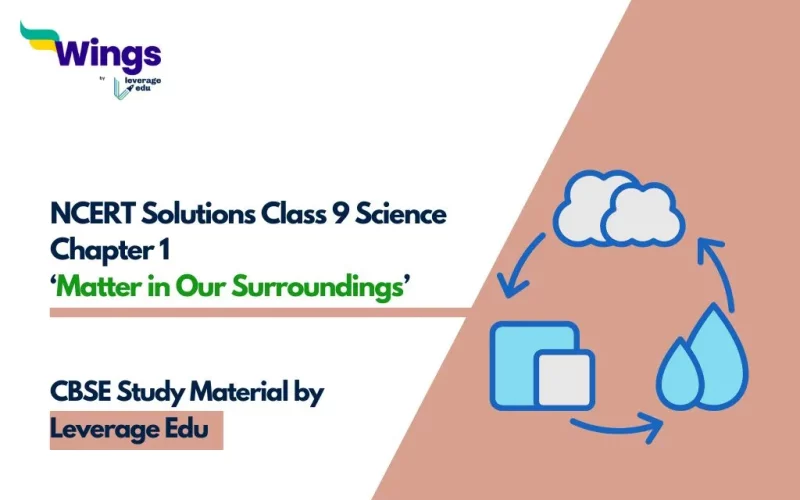We are providing NCERT Solutions Class 9 Science Chapter 1 ‘Matter in Our Surroundings’ to help you navigate through your school exams. You can also download a PDF for important questions and answers for quick revision. Let us get started!
Download the NCERT Solutions of Class 9 Science Chapter 1 PDF Here!
Download Solutions of all the Chapters of Class 9 Science:
| Chapter 1 | Chapter 2 | Chapter 3 | Chapter 4 | Chapter 5 | Chapter 6 |
| Chapter 7 | Chapter 8 | Chapter 9 | Chapter 10 | Chapter 11 | Chapter 12 |
NCERT Solutions Class 9 Science Chapter 1 Matter in Our Surroundings
Here are NCERT Solutions of Class 9 Science Chapter 1 ‘Matter in Our Surroundings’ to the questions in the exercise section of the lesson.
1. Convert the following temperature to Celsius scale.
(a) 293K (b) 470K
Solution:
0°C=273K
(a) 293K= (293 – 273)°C = 20°C
(b) 470K= (470 – 273)°C = 197°C
2.Convert the following temperatures to the Kelvin scale.
(a) 25°C (b) 373°C
Solution:
0°C = 273K
(a) 25°C = (25+273)K = 298K
(b) 373°C = (373+273)K = 646K
3. Give reason for the following observations:
(a) Naphthalene balls disappear with time without leaving any solid.
(b) We can get the smell of perfume while sitting several metres away.
Solution:
(a) Naphthalene balls, at room temperature, directly go from solid state to gaseous state without changing to liquid state. This is known as sublimation. Hence, they disappear with time without leaving any solid.
(b) Perfumes are volatile substances which means they change from liquid to gas at room temperature. And gas particles have high kinetic energy, so they spread fast. Hence, even while sitting several meters away, we are able to smell the perfume.
4. Arrange the following in increasing order of forces of attraction between the particles – water, sugar, oxygen.
Solution:
Oxygen (gas) < water (liquid) < sugar (solid)
5. What is the physical state of water at –
(a) 25°C (b) 0°C (c) 100°C?
Solution:
(a) At 25°C, the water will be liquid at normal room temperature.
(b) 0°C is the freezing point of water, hence, solid and liquid, both forms will be observed.
(c) 100°C is the boiling point of water, hence liquid and gaseous, both forms of water will be observed.
6. Give two reasons to justify –
(a) Water at room temperature is a liquid.
(b) An iron almirah is a solid at room temperature.
Solution:
(a) The boiling point of water is 100 degrees Celcius which is much more than the normal room temperature. Hence, at room temperature, water exists as a liquid.
(b) The melting point of metals is much higher than the room temperature. Hence, an iron almirah is solid at room temperature.
7. Why is ice at 273K more effective in cooling than water at the same temperature?
Solution: At 273 Kelvin, ice will absorb the latent heat to overcome the forces of attraction of the molecules and will turn to water still retaining the same temperature, but water at the same temperature will not absorb excess latent heat from the surroundings. Hence, at 273 Kelvin, ice is more effective in cooling than water.
8. What produces more severe burns, boiling water or steam?
Solution: Steam will cause more severe burns compared to boiling water because steam will first release the heat that had been consumed during the vaporization while still maintaining the same temperature.
9. Name A, B, C, D, E and F in the following diagram showing a change in its state.
Solution:
Credits: NCERT
(A) Solid to Liquid -> Melting (or) fusion (or) liquefaction
(B) Liquid to Gas -> Evaporation (or) vaporization
(C) Gas to liquid -> Condensation
(D) Liquid to Solid -> Solidification
(E) Solid to Gas -> Sublimation
(F) Gas to Solid -> solidification
Download the NCERT Solutions of Class 9 Science Chapter 1 PDF Here!
Download Solutions of all the Chapters of Class 9 Science:
| Chapter 1 | Chapter 2 | Chapter 3 | Chapter 4 | Chapter 5 | Chapter 6 |
| Chapter 7 | Chapter 8 | Chapter 9 | Chapter 10 | Chapter 11 | Chapter 12 |
Related Reads:
Explore Notes of All subjects of CBSE Class 9:
| CBSE Notes Class 9 English | CBSE Notes Class 9 History | CBSE Notes Class 9 Geography |
| CBSE Notes Class 9 Civics | CBSE Notes Class 9 Mathematics | CBSE Notes Class 9 Science |
FAQs
Ans: The first chapter in NCERT Science Class 9 textbook is “Matter in our Surroundings”.
Ans: Anything or object that occupies space and has mass is considered as matter.
Ans: Gas is a state of matter in which the molecules are very far apart and have high kinetic energy.
Follow Leverage Edu for complete study material on CBSE Notes of Class 9 Science.
 One app for all your study abroad needs
One app for all your study abroad needs













